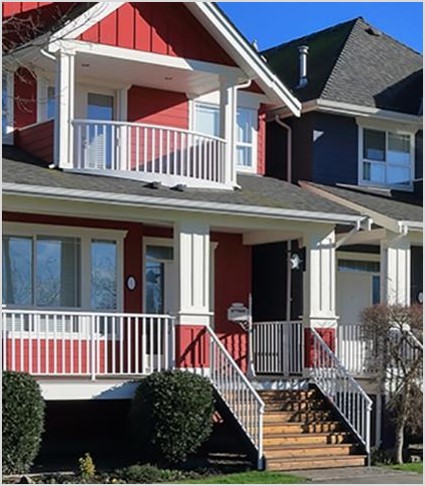Subdivision
The owner or developer of a property within the City of Powell River is responsible for the installation of services and infrastructure as required by a Subdivision or Building Permit. Infrastructure servicing and development requirements are contained in the Infrastructure Design and Construction Bylaw.
What is Subdivision?
Subdivision means altering legal property boundaries, such as:
Division of a property into smaller lots, a bare land strata, a building strata, or a phased strata;
Realignment or cancellation of existing property lines; or
Strata title conversion of existing dwellings.
The approval process allows the City to ensure that the new lots meet land use and development requirements in City of Powell River. Provincial statutes mandate subdivisions to be approved by the municipalities Approving Officer, as per the Land Title Act.
Subdivision Process
The following table summarizes our subdivision process. Fees are payable at various stages in the process. Please review our Fee Bylaw for more information.
| PRE-APPLICATION | Meet with staff to review your development intentions. Bring along a sketch plan and specific questions to make the best use of your time. |
| APPLICATION SUBMISSION | If your property is appropriately zoned, you may submit an application to seek subdivision approval. |
| INTERNAL AND EXTERNAL REVIEWS | City departments review your application to establish site-specific technical requirements that must be completed to the satisfaction of the Approving Officer before a Preliminary Layout Review (PLR) letter is prepared. The City refers the application to external agencies for comment and relevant approval requirements. The Applicant is responsible for fulfilling external agency requirements and obtaining all necessary approvals or permits. |
| PLR PREPARATION | The PLR outlines the subdivision completion requirements. The Approving Officer collects, compiles, and reviews all internal and external comments, relevant legislation, and City bylaws to determine if a proposal is eligible for PLR. The PLR will include an initial calculation of Development Cost Charges (DCCs) and other municipal fees. |
| COMPLETION OF PLR REQUIREMENTS | The PLR outlines subdivision requirements such as infrastructure improvements (road paving, water, sanitary and stormwater system upgrades, etc.), legal agreements, and environmental protection. |
| COMPLETION OR BONDING OF WORKS AND SERVICES | If you are seeking subdivision approval before installing works and services, you will need a Servicing Agreement. All services must be installed at the owner’s expense prior to final subdivision approval, unless the owner provides security and enters into a subdivision servicing agreement with the City. |
| SUBDIVISION APPROVAL | Once the Servicing Agreement and other conditions of the PLR have been addressed, you may apply for subdivision approval to the city’s Approving Officer. |
| PLAN REGISTRATION | Once signed by the Approving Officer, your plans will be returned to you, and are now ready to be registered at the Land Title Office (by you or your solicitor) along with other documents which may have been required (restrictive covenants, rights-of-way, etc.). This is the process that creates legal title for each new parcel defined on the subdivision plan. |
Pre-Application Research
There are many factors to consider during subdivision. Before setting up your pre-application meeting, find out the following information to assist your design process:
Current Zoning Bylaw and Official Community Plan designations for the property and their requirements for subdivision;
Site conditions, such as lot size, topography, drainage, soil types, and hazards;
Availability of services (water, sanitary sewer, storm water, roads and other possible service needs). Contact the Engineering Services Department for more information;
Property history (historic uses, existing buildings, prior approvals) and surrounding uses;
Applicable permit fees and additional costs of construction;
Legal encumbrances on Title (e.g. easements, covenants); and,
Provincial or federal regulations pertaining to the property.
Latecomer Agreements
Latecomer agreements are development finance agreements between a local government and a property developer. The agreement specifies off-site works and services needed for development to proceed, such as for roads, water, sewer, and stormwater. The agreement provides a way for the developer to recover costs for excess infrastructure capacity built today that someone else may benefit from in the future.
The City needs to think about the long-term future of our community. To accommodate expected future growth, the City may require a developer to build works in excess capacity that is required for the project. For example, a water main to a subdivision may be sized larger than what is required for immediate needs in order to accommodate future growth.
The cost of the excess capacity may be recovered from later development in the area and paid back to the City or the initial developer that financed the excess capacity.
The Latecomer Agreement must be enacted before constructing works and services. Click here for a the Latecomer Agreement Application Package.
How To Apply
Please click here for the Subdivision Application Form.
For an assessment on what applies to your proposal, please make an appointment with Planning Services Staff.

Contact Us
Planning Services Department
Email us
Call us at 604 485 8650
Hours
Monday to Friday
8:30am to 4:30pm
Closed on holidays
